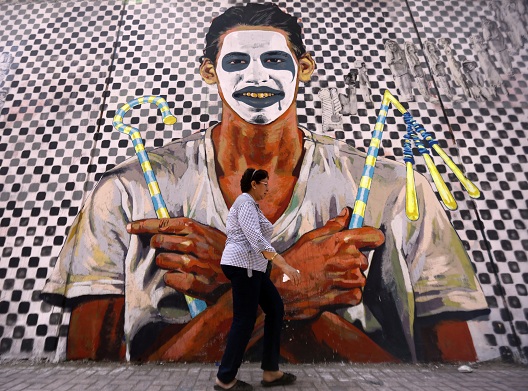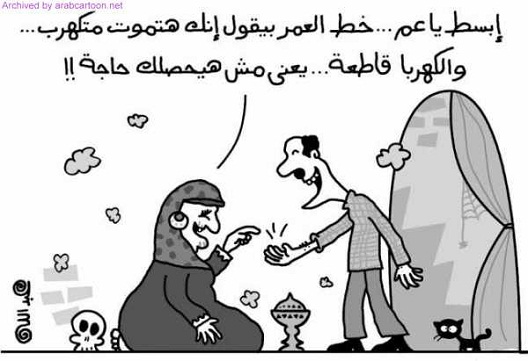 Catch up on the latest out of Egypt every week, with analysis, news updates, photos, videos, and more.
Catch up on the latest out of Egypt every week, with analysis, news updates, photos, videos, and more.
“I will not play the role they have drawn for me.” Alaa Abdel-Fattah, in a statement released by his family announcing that he is going on a hunger strike.
Monday
Leftist and liberal parties officially announce Egyptian Front Coalition
138 protests on Raba’a anniversary; CPJ condemns attacks on reporters
Sisi meets with US Congressman Darrell Issa
Tuesday
Dar Group consortium win general plan for Suez Canal project
NCHR makes recommendations to amend protest law, organizes workshop for NGO law
Egypt calls on US to exercise restraint towards Missouri protests
Wednesday
Jailed Al Jazeera journalists appeal sentences
Jailed Egyptian activists Alaa Abdel-Fattah, Ahmed Douma go on hunger strike
Washington hits back at Egypt criticism over Missouri unrest
Thursday
Officials trade blame for power shortages
World Bank to advise on Egypt’s Suez Canal mega project
Some see Qatar’s hand in collapse of Egypt-led Gaza talks
Friday
NCHR: Human Rights Watch report is deliberately misleading
Three electric transformers attacked in Minya
Palestinian president Abbas to arrive in Egypt for talks with Sisi on Gaza Crisis
On Alaa’s hunger strike | Omar Robert Hamilton, Mada Masr
The Egyptian state thrives on stasis. Nasser’s sprawling bureaucracy is the foundation of this policy of grinding inevitability. Life is slow, papers are in triplicate, processes are obscure, the traffic is unmoving, your lives unchangeable. Egypt- it tells its subjects- is the vast, eternal, center of the Arab world, the tired cradle of civilization. Change is anathema to it. Change, in fact, can only bring chaos. Change, tiny bits of it, is only possible with a wasta, with influence, cash and corruption. And just as hospitals slowly collapse, so prisoners languish in jail: their cases caught up in the delays of the built-in mechanisms of the bureaucratic machine and the petty whims of its operators.
So Alaa is going on hunger strike. It is a stand against the grinding and petty predictability of the courts system. It shifts the timetable from the potential millennia of the Egyptian state to the finite operations of the human body. Whatever they are lining up will at least come into play faster now.
In January, at a press conference, with his son in jail, Seif picked up the microphone. Leaning on his cane, he stood up and his voice filled the room: “I wanted you to inherit a democratic society that guards your rights, my son, but instead I passed on the prison cell that held me, and now holds you.”
Today, as Ahmed Seif’s body battles to keep breathing, Alaa offers his to be by his side.
One Year After Morsi’s Ouster, Looted Coptic Churches Turn into Trash Dump | Mina Fayek, Muftah
One year ago, Egypt witnessed an unprecedented number of sectarian attacks against Coptic institutions, properties, schools, orphanages, and churches nationwide…At the time, the Egyptian military vowed to restore the damaged churches. But, over a year later, these promises remain unfulfilled. It would seem, yet again, that the Egyptian state has used violence against Copts for its own cynical political purposes, and abandoned the community in its time of need.
Exploiting the Coptic community’s pains is an old tradition that has been used widely by the Egyptian state. Last year’s attacks were merely the latest iteration. Since the 1952 revolution, not one Copt has been appointed prime minister, minister of defense, or minister of the interior, three of the most important and influential political positions. Copts have also faced discrimination from state bodies and universities.
In an interview conducted before the recent presidential elections, Sisi was asked about discrimination against Copts in the military. The presidential contender and former head of the army denied it was taking place. He also objected to any need for “cleansing” Egypt’s state institutions from decades-long corruption, arguing that this rhetoric was damaging to the government…As these comments suggest, Egypt’s new president seems satisfied with the status quo and has little interest in bringing about meaningful political or social change in the country, including easing the suffering of Copts.
Exploiting the suffering of Copts and ignoring their needs is part of the regime’s many violations over the last year. It also represents the continuation of historical discrimination against this minority group and the state’s on-going reluctance to protect the human rights of Copts in Egypt.
On Twitter: #EgyPoliceTipsToUS
Egypt’s foreign ministry on August 19 said it was closely watching developments in the US city of Ferguson following clashes between security forces and protesters over the murder of African American teenager Mike Brown. In response, deputy State Department spokesperson Marie Harf hit back at Egypt in a press briefing, saying “We here in the United States will put our record for confronting our problems transparently and honestly and openly up against any other countries in the world.” Many reactions on Twitter focused on Egypt’s hypocrisy given the recent anniversary of the violent dispersal of the Raba’a al-Adeweya sit in, while others adopted the satirical hashtag #EgyPoliceTipsToUS.
From the nation that brought you 1,100 deaths in 1 day: Egypt’s foreign ministry urging US police to show restraint in #Ferguson.
— Nancy Youssef, نانسى (@nancyayoussef) August 19, 2014
So childish & utterly absurd #Egypt calls on #US to exercise restraint towards Missouri protests – #Fergusonhttp://t.co/dY1MdvoOhu
— Sherif Mansour (@sherifmnsour) August 19, 2014
Love to think #Egypt is urging US restraint in #Ferguson ‘cos a) it cares b) now knows that brutal force is wrong http://t.co/GusTZklqzQ
— Chris Doyle (@Doylech) August 19, 2014
Ya Pot! Ana Kettle! Wenta… y’know. RT “@ahramonline: #Egypt calls for restraint at #Missouri protests http://t.co/e6RC6rFpaz“
— H.A. Hellyer د. إتش (@hahellyer) August 19, 2014
Fantastic international trolling – Egypt urges U.S. to show restraint in dealing with #Ferguson unrest. http://t.co/djRhpNHCHM
— Neal Mann (@fieldproducer) August 19, 2014
My five #EgyPoliceTipsToUS#Fergusonhttps://t.co/dPy9MGti3q
— Jason Stern (@IbnLarry) August 20, 2014
#EgyPoliceTipsToUS When hurling projectiles, standing on top of a building can give a significant tactical advantage pic.twitter.com/VcBeSMeqUr
— Nour Bakr (@nour_bakr) August 20, 2014
“Shoot them in the eyes, tear gas will never be enough. You have to take their eyes off. #EgyPoliceTipsToUS” http://t.co/pwOiOGBZhl
— CairoScene.com (@CairoScene) August 20, 2014
Beat & sexually harass female protestors then come out and say “Eh eli wadaha henak?”/”Why did she go there?” #EgyPoliceTipsToUS
— Salma (@ablasalma) August 20, 2014
The Egyptian government trolled the US government; Not to be outdone, the egyptian people trolled the egyptian government #EgyPoliceTipsToUS
— السيد مانكي (@Sandmonkey) August 20, 2014
Video of the Week
In an phone call to the Egyptian television program “Ala Masou’ouleyati” (On my Responsibility), Hani Abdel Latif, spokesman for Egypt’s interior ministry, offered five tips to American police dealing with protests in Ferguson, Missouri following the murder of African American teenager Mike Brown. First, Latif urged US police not to use excessive force against protesters. Second, he called for the police to engage in a dialogue with protesters in order to prevent further violence. Third, he called for a speedy trial of the policeman accused of shooting Brown. He also asserted that the violent response of US police to the demonstrations will only create further problems in the US, and that it is important to recognize the legitimate demands of the protectors, emphasizing the peaceful nature of the protests.

Caption: “Look here, the lines on your hand say you are going to die from electrocution, but the electricity is out so nothing will happen to you!”
Interview with Egyptian Foreign Minister Sameh Shoukry | Sky News Arabia
In an interview on Wednesday with Sky News Arabia, Egyptian Foreign Minister Sameh Shoukry discussed the multiple challenges Egypt is currently facing regarding its foreign policy and global relations. He commented that the preservation of Egypt’s national security is the top priority of the ministry of foreign affairs, and that Egypt is working to achieve this goal by establishing relationships with countries all over the world, particularly its Arab neighbors. Shoukry discussed several issues, including the security situation in Libya, the current crisis in Gaza and the Palestinian issue, and Egypt’s relationship with Ethiopia. In discussing the increase in violence in Libya, Shoukry said that Egypt has no intention of intervening militarily in Libya and that it will only intervene in Libya’s affairs if it is asked to do so. He also expressed the desire for the establishment of an inclusive political process and state institutions in Libya, and added that the deteriorating security situation in Libya was an opportunity for Egypt to work together with Tunisia to confirm the cooperation between the two countries.
Egyptian education system doesn’t prepare the youth for modern jobs | Salma Wahba, The Guardian
The Guardian interviewed Salma Wahba, a youth and adolescent development officer for UNICEF Egypt on youth unemployment in Egypt and the country’s education system. She identified major economic challenges and an unstable political environment as the main causes of Egypt’s high rate of youth unemployment. She argued that there exists a mismatch between the skills of new labor market entrants and the requirements of the labor market,” which reflects a failure of the education system to provide youth with the skills to succeed in the modern workplace. In discussing solutions to Egypt’s youth unemployment problem, Wahba asserted that besides job creation, innovative solutions are needed, such as providing incentives to employers to reserve jobs for youth.
Image: Photo: A woman walks past a graffiti near Tahrir Square in downtown Cairo August 21, 2014. REUTERS/Amr Abdallah Dalsh
![The Week in Egypt [August 25, 2014]](https://www.atlanticcouncil.org/wp-content/uploads/2014/08/20140825Egypt.jpg)